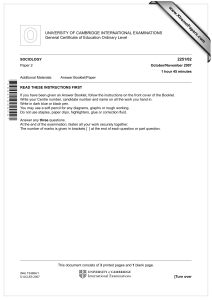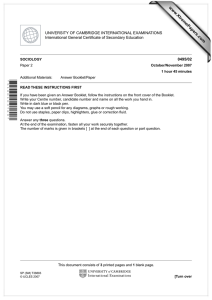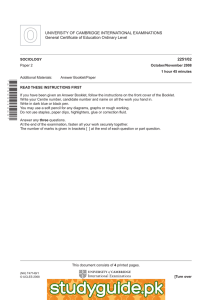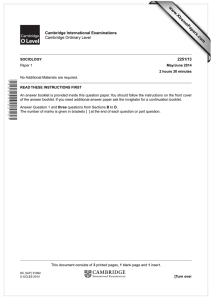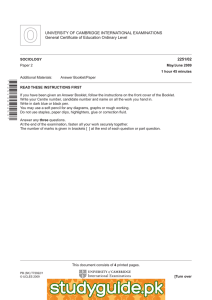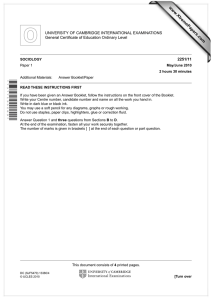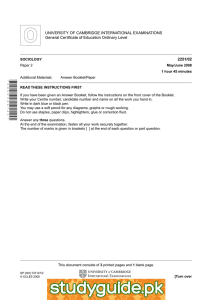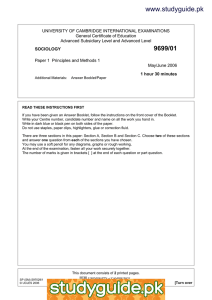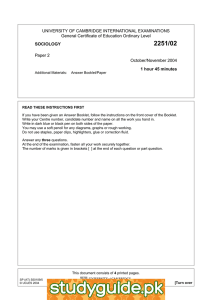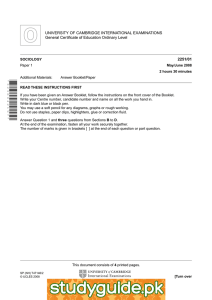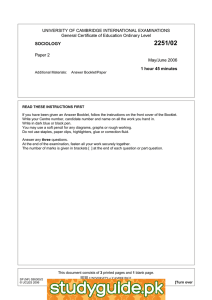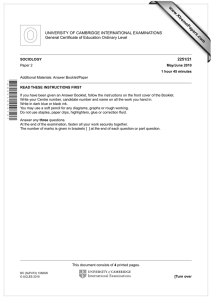UNIVERSITY OF CAMBRIDGE INTERNATIONAL EXAMINATIONS General Certificate of Education Ordinary Level 2251/02
advertisement
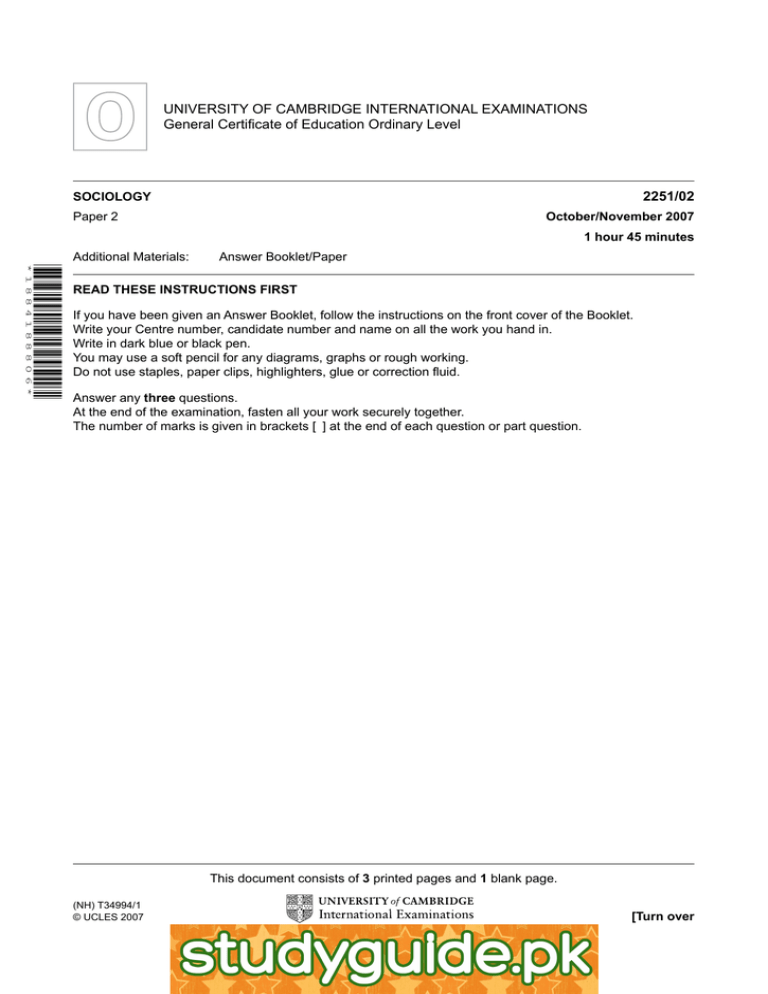
UNIVERSITY OF CAMBRIDGE INTERNATIONAL EXAMINATIONS General Certificate of Education Ordinary Level 2251/02 SOCIOLOGY Paper 2 October/November 2007 Additional Materials: 1 hour 45 minutes Answer Booklet/Paper *1884188806* READ THESE INSTRUCTIONS FIRST If you have been given an Answer Booklet, follow the instructions on the front cover of the Booklet. Write your Centre number, candidate number and name on all the work you hand in. Write in dark blue or black pen. You may use a soft pencil for any diagrams, graphs or rough working. Do not use staples, paper clips, highlighters, glue or correction fluid. Answer any three questions. At the end of the examination, fasten all your work securely together. The number of marks is given in brackets [ ] at the end of each question or part question. This document consists of 3 printed pages and 1 blank page. (NH) T34994/1 © UCLES 2007 [Turn over www.xtremepapers.net Section A: Family 1 It is claimed that families are just as important as they were in the past. By contrast with traditional societies, however, families in modern industrial societies perform fewer functions. (a) What is meant by the term functions? [2] (b) Describe two functions that families perform in traditional societies. [4] (c) Explain how the functions performed by families have changed as societies have modernised. [6] (d) To what extent are families as important today as they were in the past? 2 The extended family is associated with a more traditional way of life. Social change and economic development usually lead to the decline of the extended family. (a) What is meant by the term extended family? [2] (b) Describe two types of family unit apart from the extended family. [4] (c) Explain why social change and economic development usually lead to the decline of the [6] extended family. (d) To what extent does the decline of the extended family help to explain the rising divorce rate in modern industrial societies? [8] [8] Section B: Education 3 In a meritocracy each child has the same opportunity to benefit from the education system. (a) What is meant by the term meritocracy? (b) Describe two ways in which children may be treated equally within the education system. [4] (c) Explain why a child from a poor background may find it difficult to do well at school. (d) To what extent is there equality of opportunity for all children within the education systems of modern industrial societies? [8] 4 Schools contribute much to the socialisation of children, not least through the hidden curriculum. (a) What is meant by the term hidden curriculum? (b) Describe two examples of how schools contribute to the socialisation of young children. [4] (c) Explain how gender roles are reinforced through the hidden curriculum. (d) How far can the underachievement of some ethnic minority groups in the education system be explained in terms of the hidden curriculum? [8] © UCLES 2007 2251/02/O/N/07 www.xtremepapers.net [2] [6] [2] [6] Section C: Crime, Deviance and Social Control 5 The term ‘moral panic’ has been used to explain why the police and the public may have an exaggerated view of the extent of certain types of deviant behaviour. (a) What is meant by the term moral panic? [2] (b) Describe two examples of deviant behaviour. [4] (c) Explain why a moral panic may lead to an apparent increase in the rate of crime. [6] (d) How far is it true that some social groups commit more crimes than others? [8] 6 In some societies young people are often regarded as a separate group. They are seen to possess a distinctive youth culture. (a) What is meant by the term youth culture? (b) Describe two social characteristics that may distinguish young people from older age groups. [4] (c) Explain why youth cultures have become a feature of modern industrial societies over the last fifty years. (6) (d) How far do youth cultures represent a threat to the dominant values of society? [2] [8] Section D: Mass Media 7 The mass media distort reality by perpetuating stereotypes and reporting events in a sensationalist manner. (a) What is meant by the term stereotype? (b) Describe two examples of how the mass media may report events in a sensationalist manner. [4] (c) Explain why media reporting often distorts the reality of crime in society. [6] (d) To what extent do the mass media influence the way people behave today? [8] 8 It is important for democracy that the press is free from government control and censorship. (a) What is meant by the term censorship? [2] (b) Describe two ways in which newspapers may contribute to democracy in a country. [4] (c) Explain why it is important for democracy that the press is free of government control. [6] (d) How far do newspapers reflect the interests and opinions of different groups in society? [8] © UCLES 2007 2251/02/O/N/07 www.xtremepapers.net [2] BLANK PAGE Permission to reproduce items where third-party owned material protected by copyright is included has been sought and cleared where possible. Every reasonable effort has been made by the publisher (UCLES) to trace copyright holders, but if any items requiring clearance have unwittingly been included, the publisher will be pleased to make amends at the earliest possible opportunity. University of Cambridge International Examinations is part of the Cambridge Assessment Group. Cambridge Assessment is the brand name of University of Cambridge Local Examinations Syndicate (UCLES), which is itself a department of the University of Cambridge. 2251/02/O/N/07 www.xtremepapers.net
